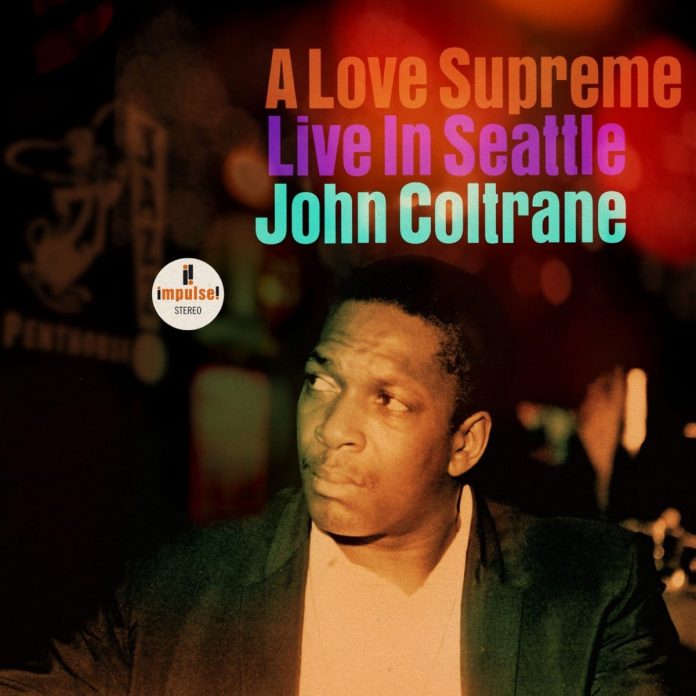In 1987 French label Esoldun released a previously unissued recording of a concert performance of A Love Supreme from the 1965 Antibes Jazz Festival, more boisterous than the studio performances. That September Coltrane’s band was in Seattle, and in 1971 Impulse issued private recordings from this engagement as Live In Seattle, performed, it has been claimed, under the influence of LSD. This current release originates from that same visit.
I haven’t combed through all the catalogues and discographies, but a general consideration of my respectably extensive collection of Coltrane recordings indicates that posthumous releases (legitimate and bootleg live recordings, unissued alternative takes or rejected performances from the official vaults etc) outnumber recordings issued in his lifetime, including those featuring him in someone else’s band. The majority add nothing new to our knowledge of his development, though there are some exceptions, like the live recordings with Thelonious Monk. Most, though, merely give us more of the same: indeed, often much, much more, viz concert recordings that illustrate why that wag Philip Larkin rather cruelly and cheaply dubbed him “the club bore”.
Arguably, this release falls somewhere in between. The main movements are given extended, more tumultuous interpretations than on the studio recording, and are separated by interludes where most of the players sit out. There had apparently been no rehearsal and Coltrane called out instructions during the performance. Sanders had only recently officially joined the band, and there was debate about the extent of his and Trane’s reciprocal influence. Many people bemoaned the way an acknowledged master adopted practices from less distinguished, less coherent disciples, but that was typical of Coltrane’s generous spirit. His ready admission of additional musicians to the band, often temporarily, was a significant factor in eventually driving away Tyner (who shines especially brightly on Pursuance) and Jones. The guests here, Ward and Garrett, do make some satisfying contributions however, with some nice interplay between Garrett and the always-impressive Garrison. The Trane-Jones axis is, as ever, an awesome force of nature.
The December 1964 studio recording of A Love Supreme is one of only two jazz albums that regularly turn up iN 100 Best Albums In The History Of The Cosmos polls, the other being Miles Davis’s Kind Of Blue, which also featured Coltrane. I often wonder whether ALS, good though it is, achieved such favour by being less scary than Ascension, recorded in June 1965. After that many of his admirers could not / would not follow the direction he took, perhaps finding comfort in ALS.
The trifold CD sleeve contains a booklet that includes useful essays by Ashley Khan and Lewis Porter (the latter a blow-by-blow account of the music) plus a piece on the technicalities of retrieving the recording from decades-old quarter-track tapes by engineer Kevin Reeves.
Discography
A Love Supreme: Acknowledgment; Interlude 1; Resolution; Interlude 2; Pursuance; Interlude 3; Interlude 4; Psalm. (75.33)
Carlos Ward (as); Coltrane, Pharoah Sanders (ts, pc); McCoy Tyner (p); Jimmy Garrison, Donald Garrett (b); Elvin Jones (d). The Penthouse, Seattle, 2 October 1965.
Impulse 8116482 (CD); 119029 (MC); GR-00155 (LP)















